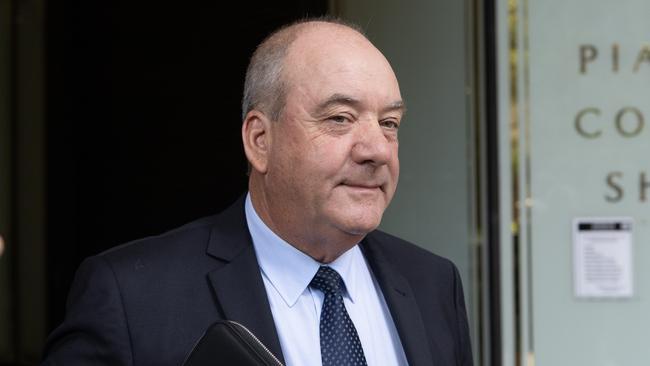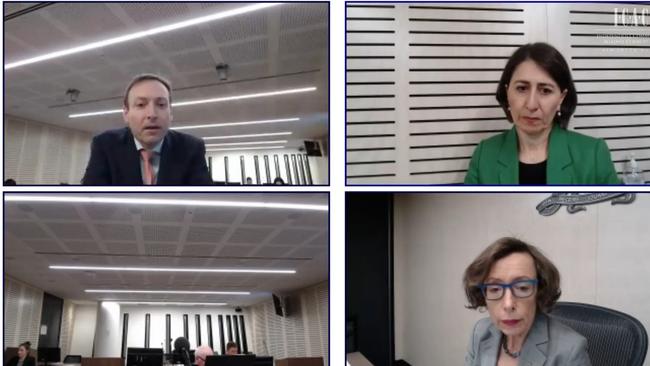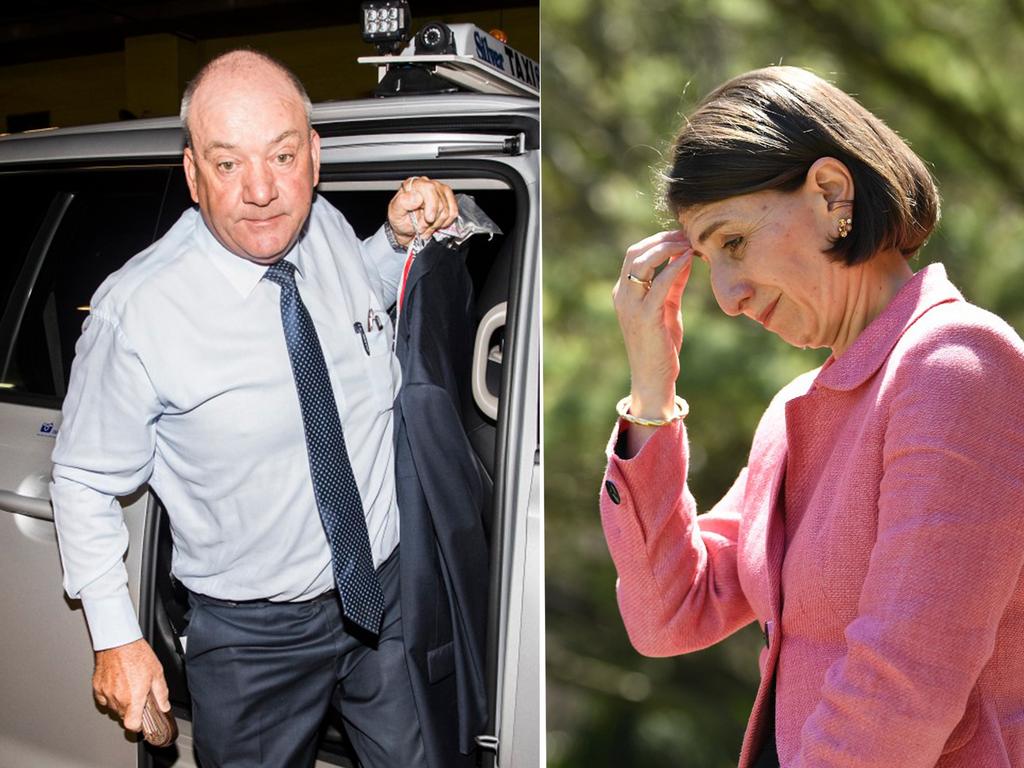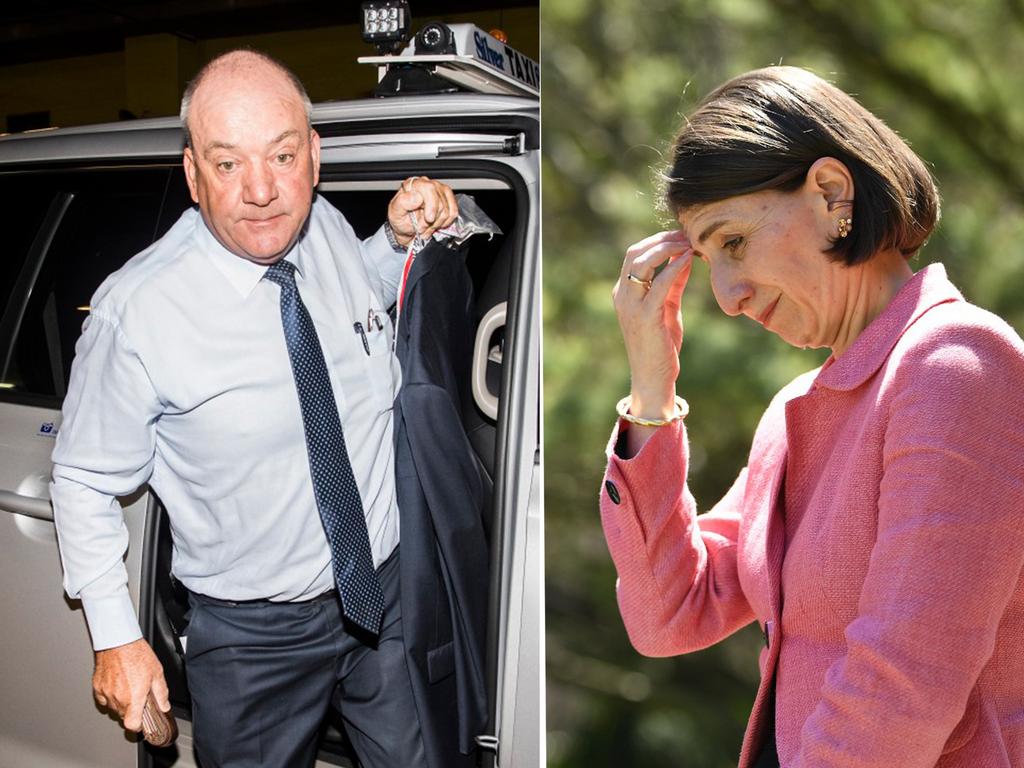ICAC corruption report: ‘I’m the boss’, Daryl Maguire told Gladys Berejiklian
ICAC has released a damning conversation between former NSW premier Gladys Berejiklian and her lover, Daryl Maguire.
The Independent Commission Against Corruption has released a damning conversation between former NSW premier Gladys Berejiklian and her lover, Daryl Maguire, which has shed light on the power dynamic between the pair, who were in a secret relationship at the time.
It comes as the watchdog found Ms Berejiklian to have engaged in “serious corrupt conduct” in her dealings with Maguire after she failed to disclose their personal relationship and effectively concealed her suspicions of his unauthorised activities.
Following an incident that occurred while they were out one evening, during which Ms Berejiklian was allegedly “mean” to Maguire, he called her up and impressed upon her that, “I am the boss, even when you’re the Premier”, and Ms Berejiklian agreed with that characterisation.
Asked by investigators in a private hearing whether she considered this exchange a fair depiction of the relationship, in the sense that Maguire, when they were alone, was “leading the party or the boss”, Ms Berejiklian replied:
“When you have a position of power, it’s very difficult in a personal relationship to address that position of power, and that’s what I was referring to. It’s very personal and private. It’s got nothing to do with work. It’s actually making him feel that because I was the boss during the day, that I wouldn’t necessarily be exercising that relationship in the private relationship.”
The ICAC said the purpose of releasing this evidence was to provide a counterfactual to Ms Berejiklian’s continual downplaying of the relationship’s significance and intensity. While taking submissions on whether to release the material, Counsel Assisting the Commission, Scott Robertson, argued that the nature of her relationship with Maguire was capable of influencing her conduct.
Robertson said this was a result of the “simple, completely legitimate and entirely human reason that people tend to wish to please and to seek to avoid disappointing the expectations or desires of people who they love and from whom they derive emotional strength”.
Ms Berejiklian described Robertson’s submission as “puerile” and the Commission responded accordingly, branding her “supercilious”, “unworldly” and an “unsatisfactory witness in many respects” who treated the witness box as “more like a husting than a place from what to respond directly” to questions.
The Commission’s report embarked on much legal and ethical wrangling as it considered what volume of personal information and correspondence it should release in order to establish the depth of Ms Berejiklian’s relationship with Maguire.
While both contended that the relationship began in earnest from about 2015, the Commission said it was in receipt of enough evidence to establish that from mid-2014 they were “exchanging messages which suggest that the relationship was one of considerable intensity accompanied by mutual and deep feelings of love”.
The messages, while not released, included plans for meals and drinks together after work, plans for holidays, discussions of marriage, children, and references to Ms Berejiklian’s house in Sydney as “home”, along with “mundane domestic arrangements such as requests to pick up bread and things to eat on the way ‘home’”.
Ms Berejiklian famously denied in NSW parliament the factual accuracy of Maguire having a key to her house, but the ICAC appears to have ended that mystery. “Although Ms Berejiklian and Mr Maguire do not appear to have cohabitated with each other for any significant period, Mr Maguire had a key to Ms Berejiklian’s home which she said she had given him ‘many years ago’.”
Moreover, the Commission decided to release a hitherto private conversation between Ms Berejiklian and Maguire that appears to outline a power dynamic between them while she was premier.
ICAC ends 18 months of uncertainty
Ending 18 months of uncertainty since her resignation as premier, the Independent Commission Against Corruption concluded that Ms Berejiklian failed to act on Maguire’s conduct and must have known that she needed to report it to ICAC. It said she did not do so in order to “protect herself and him from the Commission exercising its investigative powers”.
The Commission called this behaviour a “grave misconduct” that “undermined the high standards of probity that are sought to be achieved by the ministerial code which, as premier, Ms Berejiklian substantially administered”.
Ms Berejiklian responded to the findings of the ICAC report on Thursday afternoon saying they were being examined by her legal team.
“Serving the people of NSW was an honour and privilege,” she said. “At all times I have worked my hardest in the public interest. Nothing in this report demonstrates otherwise. Thank you to members of the public for their incredible support. This will sustain me always. The report is currently being examined by my legal team.”
A summary of the two-volume report indicates that the ICAC is now seeking the advice of the Director of Public Prosecutions on whether criminal proceedings should commence against Maguire, however it has stopped short of pursuing charges against Ms Berejiklian “for any offence”.
“The Commission is not of the opinion that consideration should be given to obtaining the advice of the DPP,” it said.
Berejiklian’s conduct was found to have not only been corrupt, but also to have breached the public trust after she sought to award a $5.5m government grant to the Australian Clay Target Association, in Maguire’s electorate, without disclosing to colleagues the nature of her close, personal relationship with him. At the time Ms Berejiklian was the NSW Treasurer.
It also found that she “partially exercised her official functions” in relation to her decision-making over a $10m grant to the Riverina Conservatorium of Music, also located in Maguire’s electorate, and which “she knew was advanced by Maguire”.

Delivering their report to parliament on Thursday, the ICAC made numerous corrupt findings against Maguire as well, including that he improperly used his office and misused his role as an MP to “advance his own financial interests and the commercial interests of his associates”.
“Other misuse of his office as an MP included attempting to advance his own private financial interests and/or those of people associated with him in connection with the sale and/or development of land in NSW,” the ICAC report said.
An investigation that both dismayed and captivated the state, the ICAC’s bombshell announcement of an investigation into Bereijiklian’s conduct, on October 1, 2021, effectively ended her political career. She appeared ashen-faced before reporters a few hours later to stand down and vociferously denied any wrongdoing.
In relation to awarding funding to the ACTA, the commission found that Ms Berejiklian took actions in circumstances where she knew Maguire was its principal proponent, including elevating the proposal to the government’s Expenditure Review Committee, and supporting it, on December 14, 2016.
It found that, as premier, she encouraged staff to follow up on the progress of the proposal after it had cleared the ERC process. “This included by communicating a request that the initial benefit – cost ratio (BCR) calculation of 0.88, by the Department of Premier and Cabinet Investment Appraisal Unit, be revisited. This ultimately led to it achieving a BCR satisfactory for Infrastructure NSW to approve its funding,” the commission said.
Appearing to also defend the time it had taken the ICAC to complete its report, the Commission noted that the failure to “promptly report” the suspected corrupt conduct meant the investigation had to be initiated from scratch by investigative officers.
“This made it necessary for the Commission to exercise all of its coercive powers as the different layers of the investigation were discovered. Earlier reporting of suspected corruption could have prevented aspects of the conduct and shortened what became a complex, multi-stage investigation.
The ICAC did not originally focus on Berejiklian as a person of interest to their investigation, codenamed Operation Keppel. The initial target had been Maguire and the unsavoury dealings he was conducting from parliament, some of which involved property developers and the provision of visas for cash.
Maguire has since admitted that he monetised his position in parliament, including, on one occasion, billing a Chinese delegation for a meeting with former premier Barry O’Farrell, which Maguire helped to arrange. The invoice dispatched charged the delegation for an “introductory service”.
The first hint of Ms Berejiklian’s concern to the inquiry was when she was called as an Operation Keppel witness in October 2020, at a time when NSW was steadily advancing through the Covid-19 pandemic and during a period when she enjoyed meteoric public approval ratings.
Ms Berejiklian agreed that she had been involved in a “close, personal relationship” with Maguire but forcefully denied any knowledge of his wrongdoing. “I always assumed … that any interests that he had that were of a private nature were appropriately disclosed.”
Arguably her most memorable remark, recorded on a telephone intercept, was made during a conversation with Maguire when he described a need for assistance with rezoning some land, in a deal that stood to clear his personal debts if successful. “I don’t need to know about that bit,” Berejiklian replied.
Some colleagues expressed discomfort with Berejiklian’s explanations, and with her failure to declare the relationship under the NSW Ministerial Code of Conduct. But as the pandemic wore on and her popularity increased further, they shrugged off the criticism and continued to pledge their support.
This continued well beyond the day of her resignation, when the ICAC revealed it had expanded its Maguire inquiries to include the premier, and that it would examine four aspects of her conduct between 2012 and 2018.

Berejiklian’s relationship with Maguire
Ms Berejiklian rose to power after her predecessor, Mike Baird, stepped down as premier in 2017.
She oversaw the state’s response to the catastrophic Black Summer bushfires before she became a nationally recognised figure during the Covid-19 pandemic.
During her time in the witness box, Ms Berejiklian was scolded by Ms McColl for repeatedly failing to answer counsel assisting Scott Robertson’s questions about her failure to notify authorities about Mr Maguire’s business dealings.
This included Mr Maguire telling Ms Berejiklian that the racing heiress Louise Waterhouse had a “big problem” with a commercial property in Sydney’s west, and needed help with rezoning and roads. Mr Maguire stood to pay off “about half” of his $1.5m in personal debt if the deal went ahead.
“I don’t need to know about that bit,” she responded.
Mr Maguire complained to Ms Berejiklian about his inability to get funding for several projects in his electorate of Wagga Wagga, to which the then premier replied she would “fix it”.
Ms Berejiklian had been personally briefed in July 2018 that two ministerial advisers were making disclosures to ICAC investigators about Mr Maguire’s alleged impropriety, but still failed to report the relationship, then it its third year.
Denying any wrongdoing, Ms Berejiklian claimed her failure to disclose the relationship had been because it had not been of sufficient substance, characterising it as “on again, off again”.
But according to evidence provided by Mr Maguire, the pair were in love and had discussed getting married and having a child. They referred to each other as hawkiss – an Armenian term for “my soul” or “my beloved”.
The public hearings revealed Mr Maguire had unsuccessfully tried to use his parliamentary office to derive a profit from several personal business opportunities, including a “cash for visa” scheme under a company named G8Way International.
The report comes after successive delays and criticism of the time it had taken Ms McColl to hand down her findings, with former judges saying the setbacks were a black mark against the agency.
After Nick Greiner in 1992 and Barry O’Farrell in 2014, Ms Berejiklian was the third Liberal premier brought down by the Greiner-established corruption watchdog.
Embroiled in the Australian Water Holdings scandal, Mr O’Farrell was forced to resign after it became apparent he had given incorrect evidence about a $3000 bottle of Grange Hermitage, but ICAC did not find adverse findings against him.
Additional reporting: Max Maddison.







